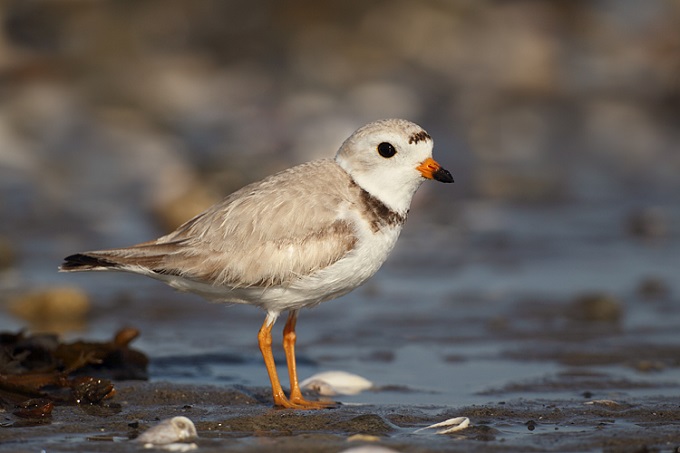
In addition to asking people to maintain proper social distancing in the outdoors, and to adhere to state park capacity limits and closures where encountered, the Department of Energy and Environmental Protection is reminding visitors to state parks to maintain a safe distance from the wildlife that call those parks home.
As the weather warms up, DEEP is urging any visitors to state beaches to keep their distance from beach nesting birds such as the state-and-federally-threatened piping plover. Piping plovers are currently returning to our state’s beaches to establish nesting areas in the very places where some residents may be going to engage in solitary, passive outdoor recreation.
Piping plovers have always practiced their own version of social distancing. Disturbance from people and dogs at beach nesting areas can prevent plovers from finding mates and establishing nesting territories and may lead to nest abandonment or the loss of eggs and death of chicks.
By following some specific steps offered by biologists in DEEP’s Wildlife Division, we can enjoy the beach, share it with beach-nesting birds, and help ensure both visitors and birds are safe.
- Follow guidance on signs and respect all areas fenced or posted for protection of wildlife. Your actions can also benefit least and common terns, American oystercatchers, and other wildlife.
- Consider leaving dogs at home when visiting beaches. Even good dogs on a leash scare piping plovers. No matter the age or size, all dogs are viewed as predators to shorebirds and cause them to panic. Stressed shorebirds are unable to feed, rest, or raise families successfully.
- Dogs are not allowed at many beach areas during the bird nesting season. These areas include but are not limited to: Long Beach in Stratford, Pleasure Beach in Bridgeport, Silver Sands State Park and Milford Point in Milford, Sherwood Island State Park in Westport, Sandy Point in West Haven, Bluff Point Coastal Reserve in Groton, and Hammonasset Beach State Park in Madison.
- Check the municipal regulations pertaining to dogs on beaches before heading to your town beach – many towns restrict dogs on beaches at certain times of the year to protect nesting birds.
- At areas where dogs are allowed, always keep them on a short leash (less than 7 feet long), but remember that even leashed dogs have the potential to startle adult birds or to step on nests and young chicks.
- Remove trash and food scraps, which attract animals like raccoons that might eat piping plovers and their eggs. Dispose of trash at home to help keep our beaches and state parks clean.
- Bird-watching can be a great way to pass the time. Remember to keep your distance so the birds feel safe.
Please respect social distancing if you encounter DEEP field staff out on beaches installing protective fencing and monitoring the birds in the days and weeks ahead. Under normal circumstances we embrace assistance from volunteers and enjoy chatting with folks about wildlife. Right now we must all be socially responsible; please be respectful and give our staff room to safely do their jobs.
Earlier this week, DEEP announced stricter measures to limit capacity at state parks. DEEP will be limiting parking capacity at certain state parks, including Hammonasset Beach State Park, on a daily, park-by-park basis as needed based on observations of park usage. Gov. Ned Lamont also authorized DEEP this week to prohibit walk-in visitors after capacity is reached. Those in violation will be subject to penalties including fines and even arrest, up to and including Class D felony charges for interfering or obstructing any lawful civil preparedness activity. In addition, any person who violates the ban will be subject to a 30-day eviction from all State Parks and other lands under DEEP’s oversight. These new measures will help DEEP manage parks safely as warmer weather is anticipated to attract more visitors to state parks.
Currently, social and recreational gatherings of more than five individuals are prohibited. DEEP staff, including Environmental Conservation Police officers and park staff, are actively monitoring for compliance with this prohibition on gatherings, and are educating visitors and enforcing the provisions of Executive Order 7N about the parks. Concurrently, DEEP will begin to implement operational changes to prohibit picnicking at state park locations.
State parks and forests remain open at this time for solitary use, or use with your immediate household.











